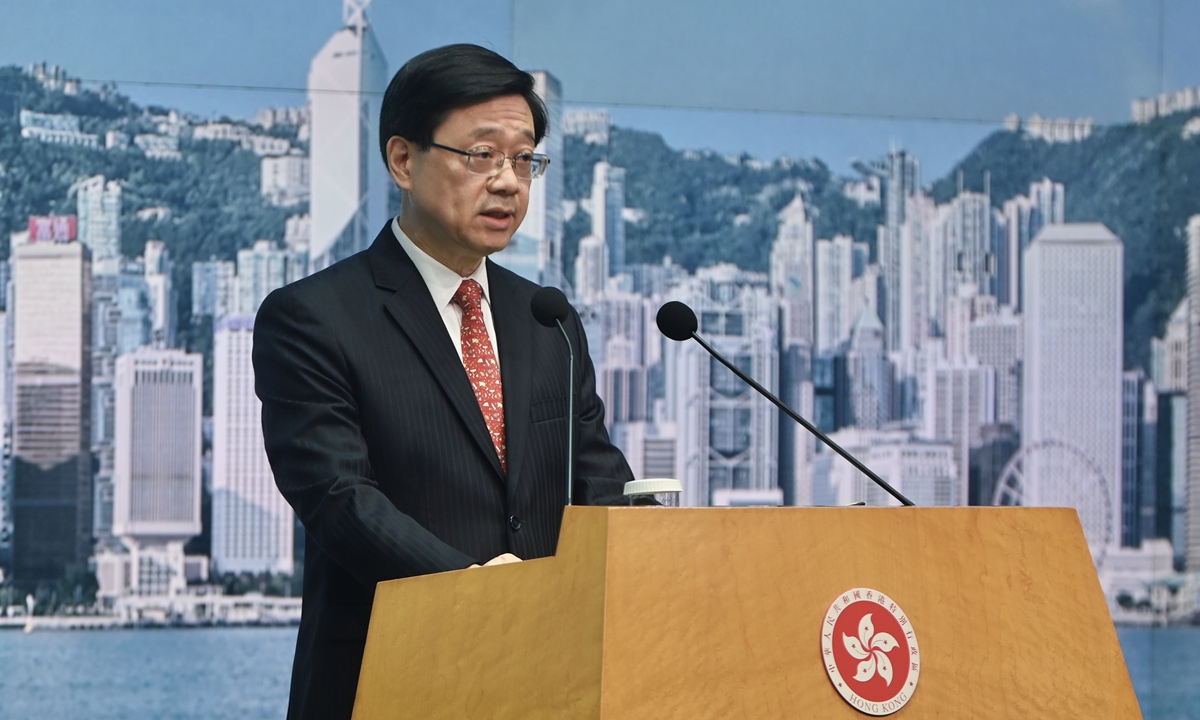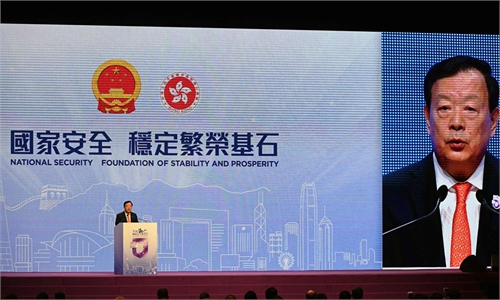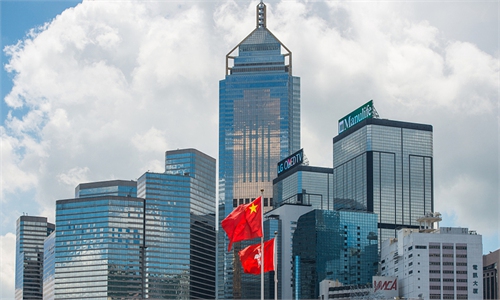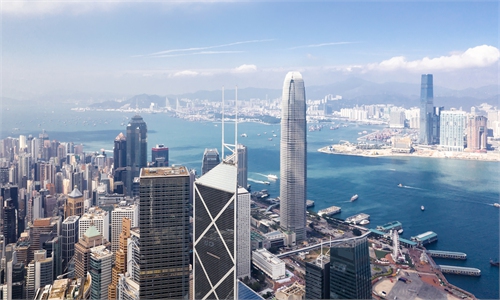HK District Councils to be retained with electoral elements, won't be secessionism platforms

John Lee Ka-chiu, chief executive of the Hong Kong Special Administrative Region, at media session before the Executive Council meeting on March 21, 2023. Lee said Hong Kong will take a more active part in the overall national development and the development of the Guangdong-Hong Kong-Macao Greater Bay Area. Photo: cnsphoto
Hong Kong Special Administrative Region (HKSAR)'s Chief Executive John Lee Ka-chiu on Tuesday revealed that the review of district administration has entered its final stage and the District Councils will be retained with a certain electoral component. At same time, he stressed that Hong Kong would not allow District Councils to become a platform for "Hong Kong secessionism."
At a regular press briefing the Executive Council meeting, Lee stressed that there are three principles for District Councils - first, national security should be put first, the principle of One Country, Two Systems should be implemented and Constitutional requirements should be fulfilled; second, the principle of "patriots governing Hong Kong" should be fully implemented; third, the District Councils should fully reflect administrative dominance.
To be specific, their functions and composition should be depoliticized, the position of Article 97 of the Basic Law should be restored, and the regional governance structure should be strengthened.
Lee said that the review of district administration has entered its final stage and in principle, the District Councils were still worth preserving, but the way they are created must be consistent with the HKSAR Basic Law. District Councils will be formed through "multiple methods" and "retain certain electoral elements," and the number of seats will be similar to that of the current term, while remuneration may be considered unchanged.
Since 2020, a large number of District Council members have violated their functions by endangering national security, advocating "Hong Kong secessionism," opposing the National Security Law for Hong Kong and interfering with government administration, Lee said.
After a series of incidents, some District Council members refused to take the oath and resigned under various excuses. Others took invalid oaths and were disqualified.
Only one-third of District Council members, namely 146, are left, Lee said, noting that the HKSAR district administration should restore order from chaos.
The HKSAR head said that the government will not allow District Councils to become a platform for "Hong Kong secessionism," violate the Basic Law or interfere with social governance. Also, the community will not allow District Councils to be hijacked, so institutional measures should be taken to prevent the recurrence of chaos.
Lau Siu-kai, a consultant from the Chinese Association of Hong Kong and Macao Studies, told the Global Times on Tuesday that from the perspective of the central government, retaining the Hong Kong District Councils is helpful for the central government to the governance of the HKSAR, especially strengthening local administration and strengthening the role of the government and regional forces and highlighting administrative leadership.
This is because the role of the District Councils is to assist the administrative organs in governing, not serve as public opinion organizations. The principle of "patriots governing Hong Kong" should also be reflected in District Councils, so that the entire governance structure is dominated by patriots, according to Lau, who is also a senior policy advisor.
Lau predicted that in the future, there will certainly not be 100 percent directly elected District Councils. It is estimated that less than half of the seats will be directly elected, he pointed out, saying that there could also be appointed and elected seats in the District Councils.
He noted that candidates should pass qualification checks to prevent anyone from using District Councils to obstruct government administration or endanger national security.
Lau did not rule out that the election vetting committee for the chief executive and Legislative Council elections would also be applied to the District Council elections, but it was unclear whether there would be other arrangements.
Lau said that over the past few years, the District Councils had been dominated by the opposition and turned into an occasion for political struggles, for obstructing the administration of the HKSAR government, for "Hong Kong secessionism" and for the operation of external forces, which was a serious deviation from the Basic Law.
With the active participation of the central government, this reform will bring District Councils back to their original aspiration and restore them to a non-political organizations supporting the HKSAR government's administration, with a view to achieving the people's satisfaction and the government's understanding, Lau said.
He pointed out that opposition forces supported by the US and some other Western countries would not be able to dominate the work of District Councils as before, and the ability of their agents cultivated in Hong Kong would be reduced.
Therefore, some Western forces would certainly not like the reform of District Councils, so they could continue to make unreasonable criticisms over the reforms in the future, and the HKSAR should not take such criticisms too seriously, Lau stated.





